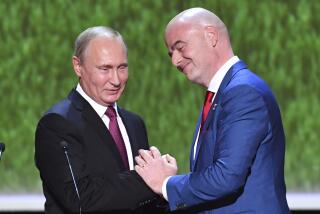Showdown in Europe: Soccer vs. Business
- Share via
BERLIN — Will DaimlerChrysler autoworkers turn out a better car than rivals at Volkswagen if they are given a lengthened lunch hour to cheer on Germany during World Cup soccer instead of being forbidden from tuning in?
Can London Stock Exchange traders still make smart deals after having a few beers with their eggs and bacon at the local pub for England’s 7:30 a.m. start against Nigeria?
Is changing midday shop closures in Spain to coincide with key game times going to please soccer-crazed consumers--or upset so many non-fans that sales will suffer during the tournament’s monthlong run?
It will probably take months to calculate the economic consequences of World Cup contests airing in the middle of Europe’s workday. But the broad range of employers’ preemptive plans for managing the conflicts--from keep-noses-to-the-grindstone edicts to company-financed let’s-root-together fests--suggests much confusion about whether it’s best to be rigid or to patriotically roll with the disruptions.
The five- to eight-hour differences between Europe and the soccer venues mean the games played at prime time in Japan and South Korea will be on television, radio and the Internet when most fans of the Continental contenders are supposed to be slaving away.
Many companies and even some governments have conceded that few minds will be on the job when the national side is on the field, and they have caved in to workers’ demands.
Giant TV Screens
Erected in Paris
Paris City Hall and the La Defense business district on the city’s outskirts have installed giant outdoor screens for public broadcasting of all the main games. The flexible 35-hour French workweek allows public servants to take off two weekdays per month--an opportunity expected to be invoked en masse Friday when “Les Bleus,” the defending champions, take on Senegal in the tournament’s 1:30 p.m. opener.
“Everything will stop during the games. Everything that can be postponed, that is,” says Enrico Antonini, head of a Rome medical clinic that has rescheduled all nonemergency cases so that nothing avoidable conflicts with game times. “Only the emergency room will be working during Italy games.”
Mindful of the mass night-shift sickouts staged during the 1970 World Cup, when Italy made it to the final against Brazil, major Italian manufacturers such as Fiat and Pirelli have revised their assembly line schedules on game days and installed big-screen TVs in worker lunchrooms. The Italians play Ecuador on Monday at what will be 1:30 p.m. in Central Europe.
For most German blue-collar workers, though, the bosses are unbending. Despite appeals from politicians for flexibility--it is an election year in Germany--most big companies informed soccer fans months ago that they would have to take vacation if they wanted to watch the workday games.
A survey of 500 major German employers by the Wirtschaftswoche business magazine found that 84% had expressly prohibited employees from following World Cup play while at their jobs. The German national team’s first game, against Saudi Arabia, is Saturday, but the more eagerly anticipated clash with Ireland falls smack in the middle of the workday for both countries Wednesday.
Even Bayer, the pharmaceutical and chemical giant that sponsors the Bayer Leverkusen team, which is one of Europe’s perennial Champions League contenders, has banned its employees from watching in laboratories, offices or warehouses.
“We work in sequential processes that can’t just be stopped on a whim,” says Meinolf Sprink, Bayer’s executive for sports matters. To make things fair, white-collar workers are also prohibited from tuning in or taking extended lunch hours. “And the Internet is supposed to be used only for work purposes,” Sprink adds.
Fever Takes Hold in
Southern Germany
In the somewhat more relaxed southern regions of Germany, employers are showing a little more understanding. DaimlerChrysler not only set up TVs in its lunchrooms, but has gotten into the spirit with a special exhibition of sports photos at its main manufacturing site near Stuttgart.
At the SAP software company near Heidelberg, co-founder Dietmar Hopp, who sponsors his own local team, is allowing any fan to follow weekday games on a big-screen TV erected in the company cafeteria.
In Britain, sports fans’ demands have been heeded in the highest circles. The British High Court issued a historic ruling April 12 allowing pubs to extend opening hours to provide the traditional venue and libations for England fans when the national team meets Nigeria on June 12 at what will be 7:30 a.m. in London.
Several big British employers are bracing for a general exodus when England plays Argentina at lunchtime June 7 in a game likely to fuel national passions that have been fierce since the Falklands War two decades ago.
Workplace.com, a major online recruitment company, has surveyed the potential effect on business of World Cup mania, estimating a loss to British business of almost $200 million. The survey predicts that 1.4 million men between the ages of 21 and 44 will call in sick on crucial game days.
With unemployment in Poland around 18%, those with jobs worry more about keeping them than they do about watching soccer, industry leaders say.
“A steelworks is a place where you simply cannot interrupt work, so such a suggestion seems absurd,” says Ewa Karpinska, spokeswoman for the Lucchini plant in Warsaw, where vacation requests have hardly increased for key Polish game days.
But in countries where soccer fever overcomes rational business judgment, managers who are loath to endorse wasting company time appear willing to at least look the other way.
Although those charting the potential threats to Europe’s already troubled economies are watching the workday contests with most concern, even some weekend games are problematic.
The Archbishop of Canterbury, George Carey, has urged vicars to take parishioners’ sporting needs into consideration during Sunday’s 10:30 a.m. England-Sweden game, suggesting that weekly services might be rescheduled around it.
The archbishop himself, though an ardent fan, will have to skip the first national contest because it coincides with Queen Elizabeth II’s jubilee celebration at Windsor Castle, perhaps the only event not subject to postponement to indulge Britons’ penchant for soccer.
Correspondents Janet Stobart in London, Achrene Sicakyuz in Paris, Maria De Cristofaro in Rome and Ela Kasprzycka in Warsaw contributed to this report.
More to Read
Go beyond the scoreboard
Get the latest on L.A.'s teams in the daily Sports Report newsletter.
You may occasionally receive promotional content from the Los Angeles Times.








